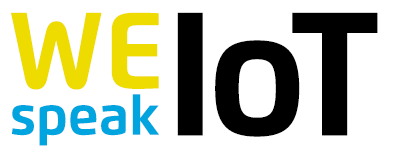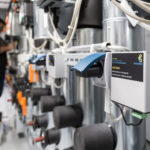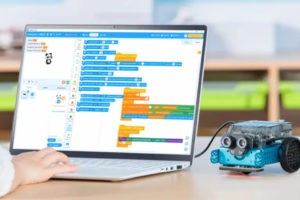Digitization in the housing industry: How to prepare for the future
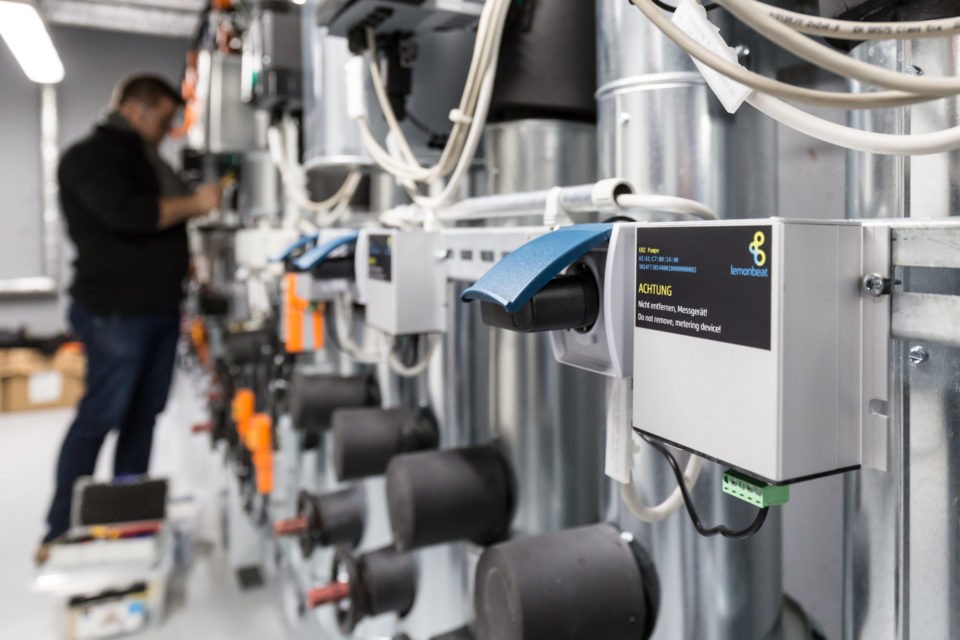
In contrast to the IT sector, where new developments are planned and executed at least once a year, the housing industry is somewhat more leisurely in terms of planning, construction and operation. As a rule, planning is made in decades instead of quarters. And yet: the housing industry will not avoid digitization either. But how can both be brought together in a sustainable and future-proof way?
In this article
The EBZ “Real-Life Laboratory”
The European Centre for the Real Estate and Housing Industry (EBZ) in Bochum wants to know exactly what is going on and has designed its extension building, which was recently opened in summer, as a “Real-Life laboratory” in which new developments are to be implemented, tested and researched.
The continuous growth of the EBZ made an extension necessary. Emerging from the housing industry training centre founded in 1957, the institution moved from the Ratinger district of Hösel to the Ruhr metropolis in 1997. With the move, the educational offer grew and at the latest since the foundation of the EBZ Business School ten years ago also the need for an expansion. However, the EBZ did not simply build a new building, but linked the new building with a research program examining future challenges in the industry – above all digitization.
The completion of the building took just under 16 months. Now it’s on to the details. A first project in the “Innovation Lab” of the EBZ is the “Smart Heating Cellar”. The focus is on efficient heat generation and distribution in the building. Two gas heat pumps for heating and cooling as well as a peak load condensing boiler for heat generation are used. Modern IT architectures are consistently used for control technology and building automation.
Among the project partners involved are innogy as a heat and energy supplier and its wholly-owned subsidiary Lemonbeat, which is responsible for the data integration of all meters and systems in the boiler room with its modern IT technology.
Founded in 2015, Lemonbeat has developed a solution for sustainable real estate management that allows any “thing” to speak to each other using flexible wireless technologies. In this case, all meters and devices used in a boiler room. In the EBZ Heizungskeller, for example, the Lemonbeat technology collects the status data of all installed meters and devices and offers the operator of the property the possibility of central remote enquiry or even control of the systems. All this is made possible on the basis of established Internet technologies. This guarantees future viability, an important question in an industry in which you have to be able to plan years in advance.
Efficient building management also as retrofit solution
But in order to be able to use the technology, no new construction is necessary. The running times of many systems already installed in existing housing stock today have long product life cycles. A premature exchange would not be economical. Instead, the existing interfaces can be used to make the technology used fit for the future and thus for the Internet of Things. One example is the Modbus protocol, which is widely used in heating systems or heat meters. Where in the past it was necessary to produce own adapters and firmware versions for at least every type of plant, often even every single software version of the plant type, despite a uniform protocol, this can now usually be achieved with a hardware and software version.
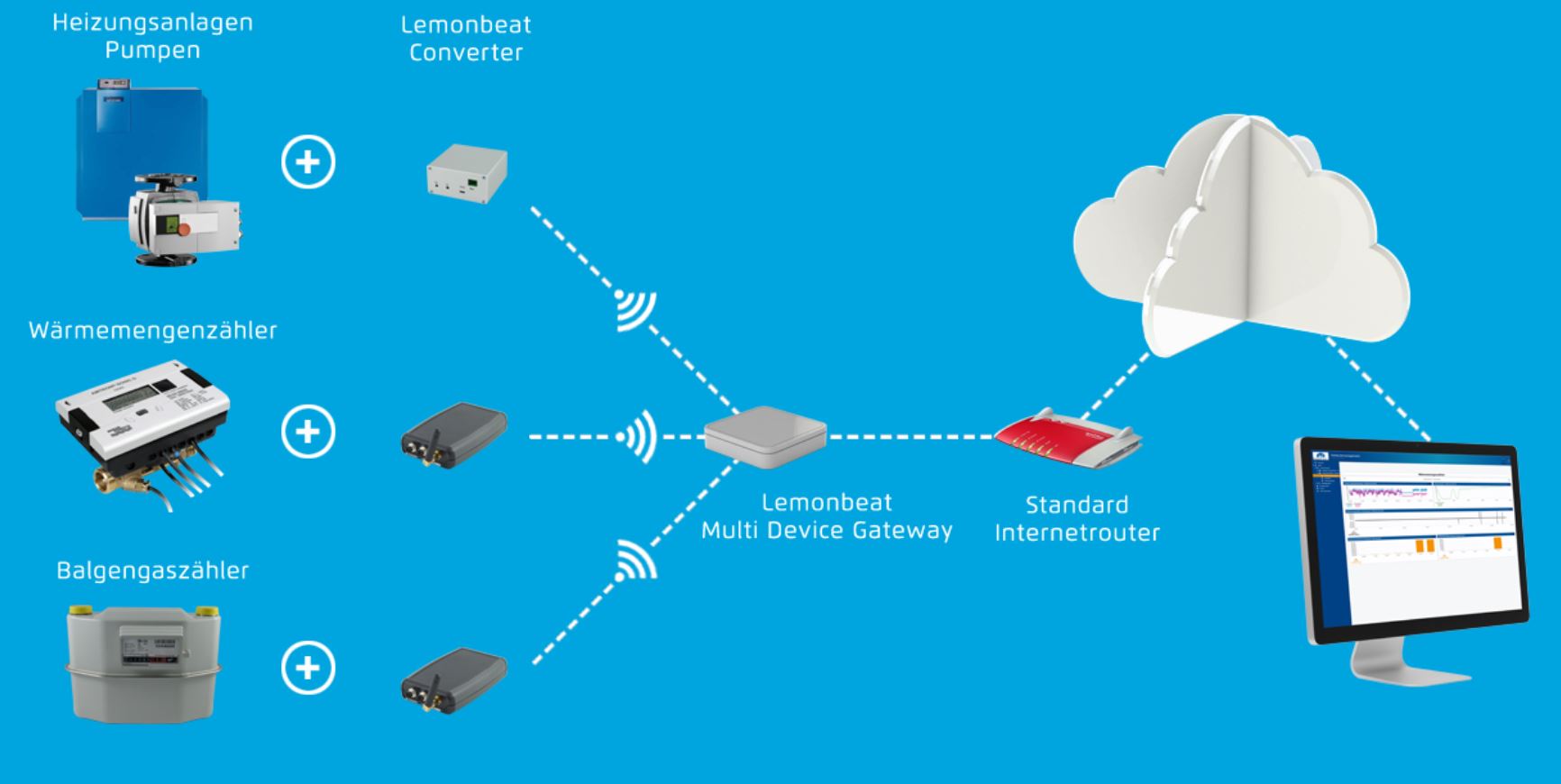
The smart heating cellar also as a retrofit solution in stock. Graphic: Lemonbeat GmbH
For Lemonbeat, it was important to create a digitization solution that could be easily and cost-effectively retrofitted to any existing boiler room. For this purpose, the affected devices are equipped with suitable adapters. The adapters make the systems “Lemonbeat-capable”. From now on, the measurement and control data are read out by the adapters, transferred to the Internet and back via a cost-effective gateway, and can be managed and processed from a central platform.
With the possibility of retrofitting the smart heating cellar, innogy and Lemonbeat want to enable the housing industry to make a smooth transition into a digital future. The focus in the field of residential building management is to create transparency about all consumption and to optimize it.
IP technologies enable future-proof concept for landlords
The highly granular data available through digitization not only enables general energy savings and a reduction in operating costs, especially in the area of personnel expenses, but also helps with future investment decisions. In addition, remote access saves unnecessary on-site visits, which in turn tie up resources and incur costs. Last but not least, real-time monitoring of the installation can alert the user to errors at an early stage or report unusually high consumption, for example in the event of a water pipe rupture.
The use of established Internet technologies ensures the necessary investment security. In the future, other devices such as undercurrent meters, water meters and heat cost allocators in apartments will also be able to communicate with the smart heating cellar. With local data acquisition, individual consumption can also be recorded more accurately and easily. This in turn helps to optimize the systems and saves invoicing costs.
With this technology, landlords would be able to provide their tenants with tools to keep them informed of their consumption and estimated costs at all times. About a smartphone app, for example. This ensures transparency, trust and encourages energy saving.
Digitization in the housing industry: new business models
Even further thought, landlords could offer services for older people. Sensors on doors and windows or the highly granular recording of consumption data can detect irregularities at an early stage and, for example, warn of hotplates that are still switched on or automatically inform relatives or nursing staff if the system notices behaviour that deviates greatly from the normal state. Usually such “Ambient Assisted Living” concepts are only possible through the installation of many additional and expensive sensors. However, the intelligent and highly granular measurement of consumption data is already able to fulfil many of these sensor technology tasks today, taking into account all data protection principles.
The EBZ in Bochum is not the only institution to introduce the new technologies. Innogy and Lemonbeat are already operating further pilot installations in several heating cellars of a major property operator in North Rhine-Westphalia, which are intended to demonstrate the advantages and cost-effectiveness of the solution in continuous operation.
Further information also available at building.lemonbeat.com
This article has been automatically translated from it’s german original into english by deepl.com


